Geographers of the Roman Era (26 vols.)
Digital Logos Edition
This product has been transferred from Community Pricing to Pre-Pub. The actual funding level may be lower than it appears, which could delay production. The amount of funding still needed will be evaluated and updated soon.
Overview
A traveler and student, Strabo learned from some of the ancient world’s best teachers, and quickly became a respected scholar himself. When he wasn’t writing or studying in Rome, he traveled to Egypt, Kush, Tuscany, Ethiopia, and Asia Minor. If he couldn’t experience something firsthand, he learned about it from those who had. With such a wealth of education and experience, Strabo had the tools to understand geography like no one before him. His work diverged from the mathematical approach used by his predecessors. He preferred a descriptive approach for people more interested in anthropology. The fruits of his labors, The Geography, provides modern readers with a valuable perspective on the ancient world.
In the nineteenth and twentieth centuries, scholars questioned the reliability of another Roman geographer, Pausanias, and his Description of Greece. Along with geography, he included descriptions of Greek culture, lore, and art. Pausianas demonstrated the value of firsthand experience when, nearly two millenia after he wrote about his travels, archaeologists used his writings to guide their excavation of historical Greek sites.
This collection contains the complete texts in their Loeb Classical Library editions. Each text is included in its original Greek, with an English translation for easy side-by-side comparison. Logos’ language tools help you to go deeper into the Greek text and explore the geographers’ elegant language. Use the dictionary lookup tool to examine difficult Greek words and find every appearance of the same word in your library. Students of history, anthropology, and geography will enjoy these works and appreciate their significance.
Key Features
- 25 books describing the ancient world’s geography and culture
- Loeb Classical Library editions
- Maps and illustrations
- Fascinating geological theories
Praise for the Authors
. . . Strabo rejects [the theory of Strato] as insufficient to account for all the [geographical] phenomena, and he proposes one of his own, the profoundness of which modern geologists are only beginning to appreciate.
—Charles Lyell, geologist, influential friend of Charles Darwin, and author of Principles of Geology
A careful, pedestrian writer, [Pausanias] is interested not only in the grandiose or the exquisite but in unusual sights and obscure ritual . . . his honesty is unquestionable and his value without par.
—Andrew Stewart, professor of Greek studies, art history, and classics, University of California, Berkeley
Product Details
- Title: Geographers of the Roman Era
- Authors: Strabo and Pausanias
- Translators: Horace Leonard Jones and W. H. S. Jones
- Series: Loeb Classical Library
- Publisher: G. P. Putnam’s Sons and Harvard University Press
- Volumes: 26
- Pages: 6,203
Individual Titles
- The Geography of Strabo, vol. 1: Books 1–2 translated by Horace Leonard Jones
- The Geography of Strabo, vol. 1: Books 1–2: Greek Text by Strabo
- The Geography of Strabo, vol. 2: Books 3–5 translated by Horace Leonard Jones
- The Geography of Strabo, vol. 2: Books 3–5: Greek Text by Strabo
- The Geography of Strabo, vol. 3: Books 6–7 translated by Horace Leonard Jones
- The Geography of Strabo, vol. 3: Books 6–7: Greek Text by Strabo
- The Geography of Strabo, vol. 4: Books 8–9 translated by Horace Leonard Jones
- The Geography of Strabo, vol. 4: Books 8–9: Greek Text by Strabo
- The Geography of Strabo, vol. 5: Books 10–12 translated by Horace Leonard Jones
- The Geography of Strabo, vol. 5: Books 10–12: Greek Text by Strabo
- The Geography of Strabo, vol. 6: Books 13–14 translated by Horace Leonard Jones
- The Geography of Strabo, vol. 6: Books 13–14: Greek Text by Strabo
- The Geography of Strabo, vol. 7: Books 15–16 translated by Horace Leonard Jones
- The Geography of Strabo, vol. 7: Books 15–16: Greek Text by Pausanias
- The Geography of Strabo, vol. 8: Book 17 translated by Horace Leonard Jones
- The Geography of Strabo, vol. 8: Book 17: Greek Text by Pausanias
- Description of Greece, vol. 1: Books 1–2 translated by W. H. S. Jones
- Description of Greece, vol. 1: Books 1–2: Greek Text by Pausanias
- Description of Greece, vol. 2: Books 3–5 translated by W. H. S. Jones
- Description of Greece, vol. 2: Books 3–5: Greek Text by Pausanias
- Description of Greece, vol. 3: Books 6–8.21 translated by W. H. S. Jones
- Description of Greece, vol. 3: Books 6–8.21: Greek Text by Pausanias
- Description of Greece, vol. 4: Books 8.22–10 translated by W. H. S. Jones
- Description of Greece, vol. 4: Books 8.22–10: Greek Text by Pausanias
- Description of Greece, vol. 5: Maps, Plans, Illustrations, and General Index translated by W. H. S. Jones
- Description of Greece, vol. 5: Maps, Plans, Illustrations, and General Index: Greek Text by Pausanias
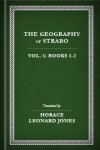
This volume contains Horace Leonard Jones’ translation of the first two books of The Geography.
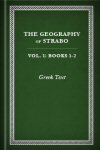
This volume contains the Greek text of the first two books of The Geography.
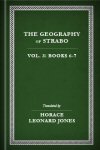
The Geography of Strabo, vol. 2: Books 3–5
- Author: Strabo
- Translator: Horace Leonard Jones
- Series: Loeb Classical Library
- Publisher: Harvard University Press
- Publication Date: 1923
- Pages: 248
This volume contains Horace Leonard Jones’ translation of books three, four, and five of The Geography.
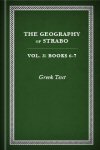
The Geography of Strabo, vol. 2: Books 3–5: Greek Text
- Author: Strabo
- Translator: Horace Leonard Jones
- Series: Loeb Classical Library
- Publisher: Harvard University Press
- Publication Date: 1923
- Pages: 248
This volume contains the Greek text of books three, four, and five of The Geography.
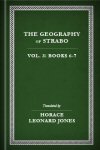
The Geography of Strabo, vol. 3: Books 6–7
- Author: Strabo
- Translator: Horace Leonard Jones
- Series: Loeb Classical Library
- Publisher: Harvard University Press
- Publication Date: 1924
- Pages: 204
This volume contains Horace Leonard Jones’ translation of books six and seven of The Geography.
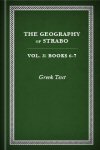
The Geography of Strabo, vol. 3: Books 6–7: Greek Text
- Author: Strabo
- Translator: Horace Leonard Jones
- Series: Loeb Classical Library
- Publisher: Harvard University Press
- Publication Date: 1924
- Pages: 204
This volume contains the Greek text of books six and seven of The Geography.
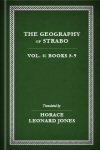
The Geography of Strabo, vol. 4: Books 8–9
- Author: Strabo
- Translator: Horace Leonard Jones
- Series: Loeb Classical Library
- Publisher: Harvard University Press
- Publication Date: 1927
- Pages: 240
This volume contains Horace Leonard Jones’ translation of books eight and nine of The Geography.
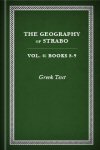
The Geography of Strabo, vol. 4: Books 8–9: Greek Text
- Author: Strabo
- Translator: Horace Leonard Jones
- Series: Loeb Classical Library
- Publisher: Harvard University Press
- Publication Date: 1927
- Pages: 240
This volume contains the Greek text of books eight and nine of The Geography.
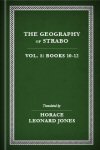
The Geography of Strabo, vol. 5: Books 10–12
- Author: Strabo
- Translator: Horace Leonard Jones
- Series: Loeb Classical Library
- Publisher: Harvard University Press
- Publication Date: 1928
- Pages: 272
This volume contains Horace Leonard Jones’ translation of books 10–12 of The Geography, an appendix on the Ithaca-Leucas problem, a partial bibliography, a partial dictionary of proper names, and two maps.
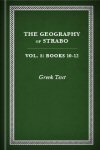
The Geography of Strabo, vol. 5: Books 10–12: Greek Text
- Author: Strabo
- Translator: Horace Leonard Jones
- Series: Loeb Classical Library
- Publisher: Harvard University Press
- Publication Date: 1928
- Pages: 271
This volume contains the Greek text of books 10–12 of The Geography.
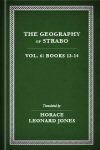
The Geography of Strabo, vol. 6: Books 13–14
- Author: Strabo
- Translator: Horace Leonard Jones
- Series: Loeb Classical Library
- Publisher: Harvard University Press
- Publication Date: 1929
- Pages: 200
This volume contains Horace Leonard Jones’ translation of books 13–14 of The Geography and a partial dictionary of proper names.
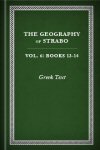
The Geography of Strabo, vol. 6: Books 13–14: Greek Text
- Author: Strabo
- Translator: Horace Leonard Jones
- Series: Loeb Classical Library
- Publisher: Harvard University Press
- Publication Date: 1929
- Pages: 197
This volume contains the Greek text of books 13–14 of The Geography.
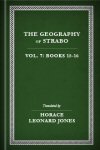
The Geography of Strabo, vol. 7: Books 15–16
- Author: Strabo
- Translator: Horace Leonard Jones
- Series: Loeb Classical Library
- Publisher: G. P. Putnam’s Sons
- Publication Date: 1930
- Pages: 190
This volume contains Horace Leonard Jones’ translation of books 15–16 of The Geography, a map of Asia, and a partial dictionary of proper names.
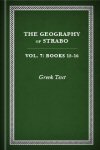
The Geography of Strabo, vol. 7: Books 15–16: Greek Text
- Author: Strabo
- Translator: Horace Leonard Jones
- Series: Loeb Classical Library
- Publisher: G. P. Putnam’s Sons
- Publication Date: 1930
- Pages: 189
This volume contains the Greek text of books 15–16 of The Geography.
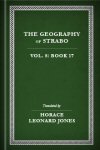
The Geography of Strabo, vol. 8: Book 17
- Author: Strabo
- Translator: Horace Leonard Jones
- Series: Loeb Classical Library
- Publisher: Harvard University Press
- Publication Date: 1932
- Pages: 263
This volume contains Horace Leonard Jones’ translation of book 17 of The Geography, an index, and maps of Egypt, Ethiopia, Libya, and the ancient city of Alexandria.
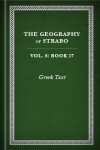
The Geography of Strabo, vol. 8: Book 17: Greek Text
- Author: Strabo
- Translator: Horace Leonard Jones
- Series: Loeb Classical Library
- Publisher: Harvard University Press
- Publication Date: 1932
- Pages: 262
This volume contains the Greek text of book 17 of The Geography.
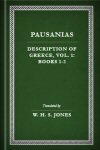
Description of Greece, vol. 1: Books 1–2
- Author: Pausanias
- Translator: W. H. S. Jones
- Series: Loeb Classical Library
- Publisher: G. P. Putnam’s Sons
- Publication Date: 1918
- Pages: 238
This text contains W. H. S. Jones’ translation of the first two books of Description of Greece.
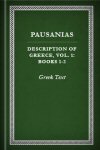
Description of Greece, vol. 1: Books 1–2: Greek Text
- Author: Pausanias
- Translator: W. H. S. Jones
- Series: Loeb Classical Library
- Publisher: G. P. Putnam’s Sons
- Publication Date: 1918
- Pages: 238
This text contains the Greek text of the first two books of Description of Greece.
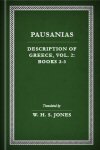
Description of Greece, vol. 2: Books 3–5
- Author: Pausanias
- Translator: W. H. S. Jones
- Series: Loeb Classical Library
- Publisher: G. P. Putnam’s Sons
- Publication Date: 1926
- Pages: 276
This text contains W. H. S. Jones’ translation of books three, four, and five of Description of Greece.
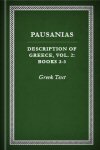
Description of Greece, vol. 2: Books 3–5: Greek Text
- Author: Pausanias
- Translator: W. H. S. Jones
- Series: Loeb Classical Library
- Publisher: G. P. Putnam’s Sons
- Publication Date: 1926
- Pages: 275
This text contains the Greek text of books three, four, and five of Description of Greece.
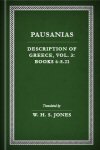
Description of Greece, vol. 3: Books 6–8.21
- Author: Pausanias
- Translator: W. H. S. Jones
- Series: Loeb Classical Library
- Publisher: Harvard University Press
- Publication Date: 1933
- Pages: 224
This text contains W. H. S. Jones’ translation of books six and seven and the first part of book eight of Description of Greece.
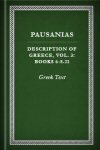
Description of Greece, vol. 3: Books 6–8.21: Greek Text
- Author: Pausanias
- Translator: W. H. S. Jones
- Series: Loeb Classical Library
- Publisher: Harvard University Press
- Publication Date: 1933
- Pages: 224
This text contains the Greek text of books six and seven and the first part of book eight of Description of Greece.
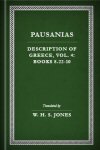
Description of Greece, vol. 4: Books 8.22–10
- Author: Pausanias
- Translator: W. H. S. Jones
- Series: Loeb Classical Library
- Publisher: Harvard University Press
- Publication Date: 1935
- Pages: 312
This text contains W. H. S. Jones’ translation of the second half of book eight and books nine and ten of Description of Greece.
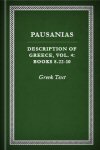
Description of Greece, vol. 4: Books 8.22–10: Greek Text
- Author: Pausanias
- Translator: W. H. S. Jones
- Series: Loeb Classical Library
- Publisher: Harvard University Press
- Publication Date: 1935
- Pages: 312
This text contains the Greek text of the second half of book eight and books nine and ten of Description of Greece.
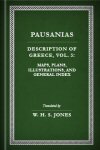
Description of Greece, vol. 5: Maps, Plans, Illustrations, and General Index
- Author: Pausanias
- Translator: W. H. S. Jones
- Series: Loeb Classical Library
- Publisher: Harvard University Press
- Publication Date: 1935
- Pages: 152
This text contains W. H. S. Jones’ translation of Pausanias’ maps and illustrations, and includes a general index.
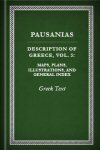
Description of Greece, vol. 5: Maps, Plans, Illustrations, and General Index: Greek Text
- Author: Pausanias
- Translator: W. H. S. Jones
- Series: Loeb Classical Library
- Publisher: Harvard University Press
- Publication Date: 1935
- Pages: 152
This text contains the Greek text of Pausanias’ maps and illustrations, and includes a general index.
About the Authors
Strabo (c. 64 BC–AD 24) was a Greek geographer, philosopher, and historian. He was born in Amaseia, in Pontus, near the Black Sea. Highly educated, he was taught by many gifted scholars. He studied rhetoric under Aristodemus and philosophy under the well-known tutor Peripatetic Xenarchus, as well as Athenodorus Cananites, and he learned grammar and geography from Tyrannion of Amisus. Many other teachers contributed to Strabo’s education, and he drew from his strong education to develop his own extraordinary geographical ideas, many of which are expressed in his most famous work, The Geography. While Strabo’s travels allowed him to experience many places first-hand, his learned teachers taught him about the places he couldn’t see himself. His other well-known work, Historical Sketches, is almost completely lost. Only a piece of papyrus remains of it, but the work is referred to by Strabo and other classical authors.
Pausanias (c. AD 110–180) was a Greek traveler and geographer. His work, Description of Greece, provides a vital connection between classic literature and archaeology through firsthand observations about ancient Greece. He takes care to describe Greek architecture, art, culture, and lore, and occasionally describes landscapes and wildlife as well. His works were nearly lost, until it became clear to twentieth-century archaeologists that his writings were both relevant and useful to their excavations of historical sites in Greece.